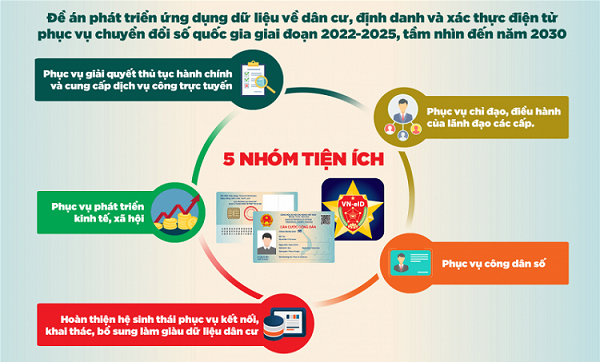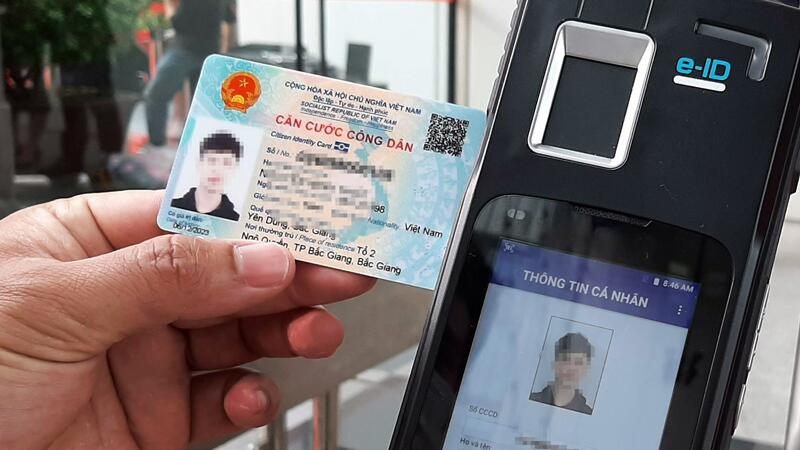On January 6, 2022, the Prime Minister issued Decision No. 06/QD-TTg approving the project “Development of Population Data Application, Electronic Identification, and Authentication to Serve National Digital Transformation for the Period 2022 – 2025, Vision to 2030” (Project 06/CP). The exploitation and application of population data, electronic identification, and authentication are of great significance in serving socio-economic development and national digital transformation.
1. Regarding the objectives of Project 06/CP:
The overall objectives of the project are as follows:
Application of the national database on population, electronic identification and authentication system, and electronic chip-embedded citizen identification cards in the national digital transformation by 2025, aiming towards 2030 to serve 5 utility groups as follows: Serving administrative procedure settlement and provision of online public services; Serving socio-economic development; Serving digital citizens; Improving the ecosystem to serve connection, exploitation, and enrichment of population data; Serving the direction and administration of leadership at all levels.
 Specific objectives:
Specific objectives:
1.1. Utility group serving administrative procedure settlement and provision of online public services
Year 2022:
Complete integration, provide authentication services for information on Citizen Identity Cards (9 digits) with Citizen Identity Cards on the National Public Service Portal, so that 100% of individual electronic identification accounts established by the National Public Service Portal, Provincial Public Service Portals can be authenticated electronically by the identity provided by the Ministry of Public Security.
Period 2023 – 2025:
- Continue to improve institutions, policies to create conditions for the development, provision of applications, digital services related to population information. Specifically, focus on drafting a National Assembly resolution amending the Law on Citizen Identity Cards.
- 100% of administrative procedures meeting the legal conditions are provided in the form of online public services at level 4 and are electronically identified, authenticated, or authenticated and share population data.
- 100% of citizens, businesses using online public services at level 4 are identified and authenticated electronically seamlessly, integrated across all information systems of government levels from central to local.
- 100% of citizens when performing administrative procedures at One-stop Division at all levels are electronically identified, authenticated on the electronic identification and authentication system of the Ministry of Public Security connected, integrated with the National Public Service Portal; no need to provide information, documents on population already available in the national population database.
- 100% of results of individual administrative procedure settlement are electronically stored with the individual identification number as a mandatory information for connection, sharing, reuse.
- 50% of forms, declarations with citizen information are standardized according to requirements from the original data of the national population database.
- Minimum 90% of citizens, businesses are satisfied with the settlement of administrative procedures on residence, citizenship, entry-exit, issuance of citizen identification cards.
- At least 50% of administrative procedures, citizen documents related to population are reduced, simplified compared to the time of issuance of this decision.
- 90% of job files related to population management at the ministerial, provincial level; 80% of job files related to population management at the district level and 60% of job files related to population management at the commune level are processed on the network environment (except job files within the scope of state secrets).
- 100% of population records are created, stored, shared electronically as regulated.
- Complete the connection of the national population database with the electronic case management system of the People’s Court to verify electronic identification for information related to parties, defendants, accused, participants in litigation or verify evidence information of the case to serve the operation of the electronic court.
 Period 2025 – 2030:
Period 2025 – 2030:
- 70% of forms, declarations with citizen information are standardized according to requirements from the original data of the national population database.
100% of job files related to population management at the ministerial, provincial level; 100% of job files related to population management at the district level and 80% of job files related to population management at the commune level are processed on the network environment (except job files within the scope of state secrets).
- Complete institutions, policies to create conditions for the development, provision of digital applications, services regarding population according to practical situations, emphasize legal dissemination related to state management initiatives.
- Complete the digital ecosystem in the implementation of administrative procedures, provide online public services linked to digital transformation of production, business activities ensuring information, electronic data only need to be provided once, with effective exploitation of electronic identification of the electronic identification and authentication system provided by the Ministry of Public Security.
- Maintain, develop, expand information infrastructure, service applications, data related to population.
- Complete, expand multi dimensional data analysis tools visualization, reporting, synthesis, statistics, dynamic reports to serve direction, administration, support decision-making or propose policy changes related to population.
- Continue to implement cooperative activities, diversify resources in building, developing, providing applications, services related to population.
- Continue to organize training, human resource development; focus on training a force of experts specializing in data analysis, exploration using new technologies such as Data Science and Artificial Intelligence.
- Continue to implement scientific research tasks, prioritize applied research topics with results, products suitable for development direction, application of population data.
- Continuously update and innovate methods of propaganda, dissemination, and popularization of digital skills for utilities, services related to population for all social groups.
- Promote the application of population data by the Ministry of Public Security in state management of ministries, branches, localities, and serving civil transactions, economy.
 1.2. Utility group serving economic and social development
1.2. Utility group serving economic and social development
Phase from 2022 to 2023:
- Research legal regulations to ensure legal compliance for the implementation of population data, identification, and electronic authentication applications in digital transformation efforts contributing to economic and social development. Research and pilot the application of electronic chip features on Citizen Identity Cards in financial sectors, banking activities, and other economic and social development fields.
- Upgrade and enhance the electronic identification and authentication system; research expanding the application of the system in electronic transactions serving economic and social development.
- Integrate and develop applications on the electronic identification and authentication system platform with core applications such as: e-Wallets, cashless payments, securities, electricity, water… onto the VNEID application, QR code of Citizen Identity Cards with electronic chips.
- Widely deploy the application of electronic chip features on Citizen Identity Cards in financial sectors, banking activities (account opening, customer identification, payments, loans, e-wallets…) and other economic and social development fields.
- Develop, improve, and effectively deploy the VNEID mobile application based on expanding integration of information, services such as healthcare, insurance, driver’s licenses, banking, electronic payments, emergency response, incident reporting, and criminal reporting…
Phase from 2024 to 2025:
Complete the ecosystem of digital applications, utilities provided to ministries, sectors, localities, and business organizations to ensure that population data is verified through identification and information authentication with biometrically secured identification factors when conducting transactions serving economic and social development.
Phase from 2026 to 2030:
Continue to maintain the operation of the electronic identification and authentication system; the electronic identification and authentication model ensures effective operation, linked with the digital signature value chain, electronic contracts, electronic identification forming the foundation of a digital government with newly created values serving digital citizens.
 1.3. Utility group serving digital citizens
1.3. Utility group serving digital citizens
Year 2022:
- Ensure the establishment of electronic identification for citizens whose data has been collected into the National Population Database; fulfill 100% of citizens’ requests for establishing electronic identities. Promote awareness and registration for citizens to understand and use electronic identification in administrative transactions, identity verification, and public services.
- Ensure 100% authentication of essential and important information on the VNEID application or through Citizen Identity Cards with electronic chips such as vaccination information, testing, driver’s licenses, vehicle registration… step by step replacing citizens’ documents in certain transactions as prescribed by law.
- Provide public services, commercial services serving citizens’ digital utilities on the VNEID application such as residency services, citizen identity cards, e-commerce, electronic payments, and other services.
Phase from 2023 to 2025:
- Strive to achieve over 40 million user accounts on the VNEID application and build an ecosystem providing public services, e-commerce services, electronic payment platforms, cashless payments, and replacing citizens’ documents in electronic transactions.
- Ensure 100% of transactions by digital citizens are identified, digitally signed, authenticated, electronic contracts are identified, digitally signed.
Phase from 2025 to 2030:
Strive to achieve over 60 million user accounts on the VNEID application and build an ecosystem providing public services, e-commerce services, electronic payment platforms, cashless payments, and replacing citizens’ documents in electronic transactions.
1.4. Enhance the ecosystem to facilitate connectivity, exploitation, and enrichment of population data.
Year 2022:
Ensure that 100% of citizen data is stored in the National Population Database, assigned a personal identification number, and issued an electronic chip-embedded Citizen Identity Card within the age range. Efficiently implement connectivity and sharing between the National Population Database and other national databases, specialized databases according to Decision No. 1911/QD-TTg dated November 15, 2021, of the Prime Minister contributing to enriching population data, including:
- Establishing a foundation for sectors closely related to citizens to utilize the national population database platform to address procedures in the absence of infrastructure such as legal, labor, and social security fields…
- Focus on completing connections with existing national databases, specialized databases to ensure accurate and convenient citizen service procedures.
- For ministries, sectors under deployment, constructing databases needing exchange, coordination with the Ministry of Public Security in deployment, connecting with the National Population Database to ensure efficiency and savings.
Year 2023 and subsequent years:
Ensure integration, connectivity, and information sharing between the National Population Database and databases of ministries, sectors, and localities to ensure smoothness and effective operation.
1.5. Serve the direction and administration of leadership at all levels.
Year 2022:
Aggregate, analyze, forecast enriched information through data connectivity, sharing with other databases to serve the governance of the Government, Prime Minister, economic, and social policy planning; meet the operational requirements of the People’s Police force and the needs of organizations, enterprises. Integrate with the Government’s command and control information system, ensuring connectivity, speed, and effectiveness as required by the Government, Prime Minister.
Year 2023 and subsequent years:
Continue to connect, share population database data with other databases to enrich population data for aggregation, analysis, and forecasting of information to serve the governance of the Government, Prime Minister, economic, and social policy planning; meet the operational requirements of the People’s Police force, the needs of ministries, sectors, localities, and organizations, enterprises.
2. Tasks and Solutions from Project 06/CP
Complete policies and laws on the development, provision of applications, digital services related to population information; Serve administrative procedure resolution, provide online public services; Serve economic and social development; Serve digital citizenship development; Improve the ecosystem to serve connectivity, exploitation, supplementation, and enrichment of population data; Serve guidance, administration.
 3. Regarding the Implementation Organization of Project 06/CP
3. Regarding the Implementation Organization of Project 06/CP
Decision No. 06/QD-TTg of the Prime Minister has specifically assigned responsibilities to ministries, sectors, and localities for implementation. The Prime Minister, Chairman of the National Digital Transformation Committee, comprehensively directs the activities of the Project, assigning Comrade Vu Duc Dam – Deputy Prime Minister to assist the Prime Minister and Chairman of the Government in directly overseeing the activities of the Project; review and resolve regular tasks of the Project. Establish the Project Development Task Force with the Minister of Public Security as the Head; The Minister, Head of the Government Office, acts as the Head and representative of the leadership of participating ministries, agencies including: the Government Office; Ministry of Public Security; Planning and Investment; Ministry of Education and Training; Ministry of Labor – Invalids and Social Affairs; Ministry of Finance; Ministry of Justice; Ministry of Information and Communications; Ministry of Natural Resources and Environment; Ministry of Health; Vietnam Social Security. The task force provides guidance, urges ministries, sectors, and local organizations to efficiently implement the tasks of the Project. The development task force of the Project will develop urban development plans, guide local organizations, specialized agencies, and departments to effectively implement the tasks of the Project on a monthly basis.
Above are the details of the “Project for Developing Population Data, Identification, and Electronic Authentication Applications to Serve National Digital Transformation for the 2022-2025 Period, with a Vision to 2030”. For enterprises when implementing provisions on chip-embedded eID authentication, the related solution contents concerning the economic and social development utility group are specific directions that enterprises need to particularly note. These contribute to the effective implementation and development of the Project, enhancing the quality of life for all citizens.
For customers interested in electronic identification through SmartKYC.eID chip-embedded CCCD, please contact us for advice and answers from our team of experts.
——————
Smart Solutions – Digital Transformation Solution Ecosystem
Under GMO-Z.com RUNSYSTEM Digital Transformation Block
Website: https://ssolutions.vn/
Facebook: https://www.facebook.com/ssolutions.dx
Hotline: 097 583 0096
Locations: Hanoi – Hue – Da Nang – Ho Chi Minh City – Tokyo
 Specific objectives:
Specific objectives: Period 2025 – 2030:
Period 2025 – 2030: 1.2. Utility group serving economic and social development
1.2. Utility group serving economic and social development 1.3. Utility group serving digital citizens
1.3. Utility group serving digital citizens 3. Regarding the Implementation Organization of Project 06/CP
3. Regarding the Implementation Organization of Project 06/CP


